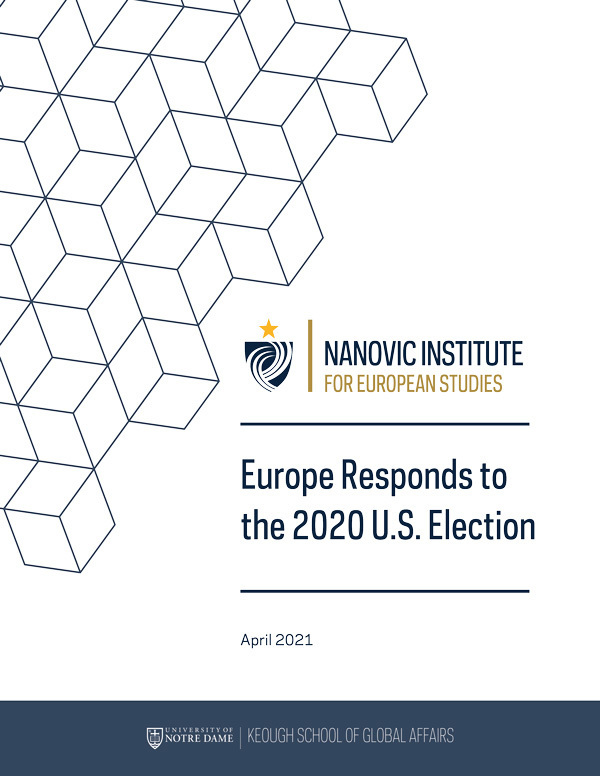Europe Responds to the 2020 Election
Europe Responds to the 2020 Election

In April 2021, the Nanovic Institute for European Studies was pleased to announce the publication of “Europe Responds to the 2020 U.S. Election.” This report, funded by the Nanovic Institute, is the result of collaborative research and writing by nineteen undergraduate students at the University of Notre Dame.
In the lead-up to the 2020 U.S. presidential election, Institute Interim Director Clemens Sedmak saw an opportunity for students to deepen their understanding of the relationship between the United States and Europe. By researching European responses to the U.S. election over the special winter session, students gained new perspectives on the United States and Europe as well as the importance of the relationship between the two.
This ambitious project provides an overview of responses to the 2020 U.S presidential election on a country-by-country basis, focusing on how politicians, the media, and the general public in countries across the European continent viewed the two candidates, Donald Trump and Joe Biden. The second part of the report considers the future of U.S.-Europe relations under a Biden presidency, paying attention to both the European Union and to individual states. These relationships, the authors find, will continue to be shaped by challenges like climate change and political extremism, the demands of European economic, foreign, and security affairs, and the level of trust European actors have in the democratic process and institutions in the U.S.
The Nanovic Institute congratulates all of those involved in this project. The report presents a two-fold conclusion on how the events around Biden’s election will shape the future of U.S.-European affairs. On one hand, the authors argue, the lead-up and aftermath of the election, including the Capitol riots on January 6, 2021, have damaged European confidence in American democracy. European nations now view the U.S. with greater skepticism and as a less reliable ally. The report concludes that the European Union, in particular, is now more motivated to “work towards independent strategies and policies for tackling European problems.” On the other hand, the authors do see cause for optimism in Biden’s pledge to take a more active role in international affairs than his predecessor, particularly his decision to rejoin the Paris Agreement. “The prospect of a more reliable international American presence,” the report concludes, “may be enough to begin to repair the transatlantic relationship.”
View and Download the Publication
Authors
Enzo Ambrose
Catharina Brunner-Lopez
Emilia Castelao
Emma Dudrick
Will Forsen
Katherine Huffert
Genevieve Klien
Madison Branz
Victoria Kuprewicz
Grace Ma
Ryan Merrigan
Sophia Michetti
Nora Murphy
Maggie O'Brien
Bridget Paulmann
Grace Rozembajgier
Meilin Scanish
Gavin Shust
Joseph Speicher